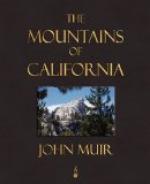the few survivors linger languidly in the washed-out
gulches or sleepy village like harried bees around
the ruins of their hive. “We have no industry
left now,” they told me, “and no
men; everybody and everything hereabouts has gone
to decay. We are only bummers—out of
the game, a thin scatterin’ of poor, dilapidated
cusses, compared with what we used to be in the grand
old gold-days. We were giants then, and you can
look around here and see our tracks.” But
although these lingering pioneers are perhaps more
exhausted than the mines, and about as dead as the
dead rivers, they are yet a rare and interesting set
of men, with much gold mixed with the rough, rocky
gravel of their characters; and they manifest a breeding
and intelligence little looked for in such surroundings
as theirs. As the heavy, long-continued grinding
of the glaciers brought out the features of the Sierra,
so the intense experiences of the gold period have
brought out the features of these old miners, forming
a richness and variety of character little known as
yet. The sketches of Bret Harte, Hayes, and Miller
have not exhausted this field by any means. It
is interesting to note the extremes possible in one
and the same character: harshness and gentleness,
manliness and childishness, apathy and fierce endeavor.
Men who, twenty years ago, would not cease their shoveling
to save their lives, now play in the streets with
children. Their long, Micawber-like waiting after
the exhaustion of the placers has brought on an exaggerated
form of dotage. I heard a group of brawny pioneers
in the street eagerly discussing the quantity of tail
required for a boy’s kite; and one graybeard
undertook the sport of flying it, volunteering the
information that he was a boy, “always was a
boy, and d—n a man who was not a boy inside,
however ancient outside!” Mines, morals, politics,
the immortality of the soul, etc., were discussed
beneath shade-trees and in saloons, the time for each
being governed apparently by the temperature.
Contact with Nature, and the habits of observation
acquired in gold-seeking, had made them all, to some
extent, collectors, and, like wood-rats, they had gathered
all kinds of odd specimens into their cabins, and now
required me to examine them. They were themselves
the oddest and most interesting specimens. One
of them offered to show me around the old diggings,
giving me fair warning before setting out that I might
not like him, “because,” said he, “people
say I’m eccentric. I notice everything,
and gather beetles and snakes and anything that’s
queer; and so some don’t like me, and call me
eccentric. I’m always trying to find out
things. Now, there’s a weed; the Indians
eat it for greens. What do you call those long-bodied
flies with big heads?” “Dragon-flies,”
I suggested. “Well, their jaws work sidewise,
instead of up and down, and grasshoppers’ jaws
work the same way, and therefore I think they are the
same species. I always notice everything like
that, and just because I do, they say I’m eccentric,”
etc.




